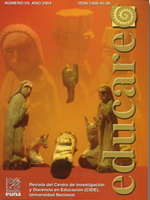¿Puede atribuírsele valor estético a la música popular? Una postura frente a adorno
DOI:
https://doi.org/10.15359/ree.2004-7.8Abstract
Abstract. This essay is based on the theories of the German musician and critic Theodor W. Adorno (1903-1969), who assigned to music a key role as a forming (or deforming) agent of human conscience. From his point of view, “good music” (classical music, for instance) redeems the individual, while “bad music” tends to preserve the existing order alienates humans, depriving them from their critical capacity; jazz, pop music and other music genres fall into this last category and the they are not assigned any aesthetics value. The author analyzes Adorno's position and pleads in favor of popular music. In order to achieve this, she analyzes the aesthetics of music in small towns, folklore, and the origin and impact of modern rhythms such as rap music.References
Adorno T. (2000). Sobre la música. Ediciones Piados. I.C.E. de la Universidad Autónoma de Barcelona.
Bowman W. (1998). Music as Social and Política! Force. Philosophical
Perspectives on Music (304-52). Oxford University Press.
Camacho D. (1972). La dominación cultural en el subdesarrollo. Editorial Costa Rica, San José Costa Rica.
Fubini E. (1970). La estética musical del siglo XVIII a nuestros días. Barral Editores, S.A. Barcelona.
Horkheimer M., T. Adorno. La industria cultural. Iluminismo como
mistificación de masas. Monte Á vila Editores C. A.
Park S. B. (1993). An aesthetics of the Popular Arts. Almqvist & Wiksell International, Uppsala.
Rader M. A Modern Book of Esthetics. An Anthology. Holt, Rinehart and
Winston, University of Washington.
Downloads
Published
How to Cite
Issue
Section
License
1. In case the submitted paper is accepted for publication, the author(s) FREELY, COSTLESS, EXCLUSIVELY AND FOR AN INDEFINITE TERM transfer copyrights and patrimonial rights to Universidad Nacional (UNA, Costa Rica). For more details check the Originality Statement and Copyright Transfer Agreement
2. REUTILIZATION RIGHTS: UNA authorizes authors to use, for any purpose (among them selfarchiving or autoarchiving) and to publish in the Internet in any electronic site, the paper´'s final version, both approved and published (post print), as long as it is done with a non commercial purpose, does not generate derivates without previous consentment and recognizes both publisher's name and authorship.
3. The submission and possible publication of the paper in the Educare Electronic Journal is ruled by the Journal’s editorial policies, the institutional rules of Universidad Nacional and the laws of the Republic of Costa Rica. Additionally, any possible difference of opinion or future dispute shall be settled in accordance with the mechanisms of Alternative Dispute Resolution and the Costa Rican Jurisdiction.
4. In all cases, it is understood that the opinions issued are those of the authors and do not necessarily reflect the position and opinion of Educare, CIDE or Universidad Nacional, Costa Rica. It is also understood that, in the exercise of academic freedom, the authors have carried out a rogorous scientific-academic process of research, reflection and argumentation thar lays within the thematic scope of interest of the Journal.
5. The papers published by Educare Electronic Journal use a Creative Commons License:














 The articles published by Educare Electronic Journal can be shared with a Creative Commons License:
The articles published by Educare Electronic Journal can be shared with a Creative Commons License: 



